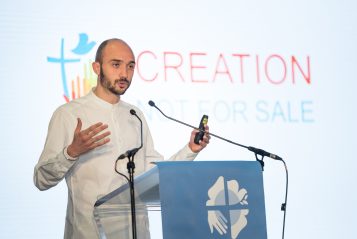If she needs reassurance that her work on creation care is important, Ruth Ivory-Moore just thinks of her two grandsons, 4-year-old Declan and 9-year-old Zayvier. “I want to make sure that they get to live in a world that I knew,” she said.
Growing up in rural Sussex County, Va., Ivory-Moore remembers being awed by God’s creation as she gazed at bright stars spilling across the summer night sky and heard the whippoorwill call. “I want them to be enjoying nature,” she said, “to be enjoying what is created here, and the beauty of this world.”
As ELCA Advocacy’s program director for environment and corporate social responsibility, Ivory-Moore helps lead the church’s efforts to make caring for creation a priority among God’s people. The creation care movement has deep roots in the church but has gained urgency as global environmental problems have worsened. Increased frequency of extreme weather events, floods, droughts, wildfires, species extinctions and melting glaciers are symptoms of a huge problem humanity must confront.
“We don’t have a choice,” Ivory-Moore said. “Climate change is real.”
Scientists say time is running out for people to act before it’s too late.
“All kinds of tipping points are looming very dangerously,” said Barbara Rossing, an ELCA pastor, author, environmental advocate and professor at the Lutheran School of Theology at Chicago (LSTC). “But we can walk back from the cliff.”
Lutherans are rising to the challenge. Across the church, congregations, synods, the churchwide organization and ELCA-affiliated ministries are working with ecumenical partners to educate people about creation care, and to inspire and organize them to take action.
“I see tremendous hope,” Ivory-Moore said, “because people know that we need to care for creation.”
A biblical mandate
The Bible reveals humanity’s responsibility to care for creation. Jesus commands people to love their neighbors as themselves, including neighbors halfway around the globe and the generations of neighbors who will follow. And God entrusted God’s good creation to humanity, beginning with the instruction in Genesis 1:28 to “subdue” and “have dominion” on earth—a common point of misunderstanding.
“What does it mean?” asked Larry Jorgenson, referring to the word “dominion.” Jorgenson was a lead author of the 1993 ELCA social statement “Caring for Creation: Vision, Hope and Justice.” Often cited as a license to exploit the earth for profit, “dominion” is better interpreted as caretaking for creation with love, modeled after the way God cares. Jorgenson said a faithful question is: “How do you have ‘dominion’ in the way the Christ has ‘dominion’?”
Passed at an ELCA churchwide assembly just five years after the denomination was formed, “Caring for Creation” shows the priority that Lutherans place on environmental issues. This document also provided a foundation for a related social statement on economic life that was adopted in 1999: “Sufficient, Sustainable Livelihood for All.”
When the two statements were formulated in the 1990s, climate change was just emerging as a concern, but pollution of air and water, such as the massive 1989 oil spill from the Exxon Valdez tanker into Alaska’s pristine Prince William Sound, galvanized public attention.
“The Exxon Valdez oil spill crushed my spirit and grieved me in and out,” said Kim Winchell, an Alaska-born ELCA deacon for whom the spill was both a wake-up call and a call to action. She was motivated to help start recycling programs in her workplace and community, and that was just the start. “Out of that disaster I took a step and then another step and then another step,” she said.
Becoming increasingly more involved in the church’s environmental movement, Winchell eventually authored Awakening to God’s Call to Earthkeeping, the ELCA’s 2006 curriculum for congregations and individuals. She likes the term “awakening” to describe how God nudged her and nudges all people into environmental consciousness.
“It takes a spiritual epiphany,” she said. Conversation, deep sharing and education can get things moving, but God steps in. “It’s got to come from your heart, but it takes the Holy Spirit to help affect that too,” she added.
Prophetic imagination
Lutheran theologians, pastors and advocates are finding renewed voices and creative ways to engage God’s people in addressing the environmental crisis.
“We need what (Old Testament scholar) Walter Brueggemann called prophetic imagination,” said Leah Schade, an ELCA pastor who writes and teaches on environmental issues at Lexington (Ky.) Theological Seminary. “We need a holy imagination to cast a vision for what God intended and what God wants for this world and for our bodies.”
Prominent prophetic voices are emerging, such as Greta Thunberg, the 17-year-old Swedish activist whose words “How dare you!” shamed world leaders for their inaction on climate change. Another is Pope Francis, whose 2015 encyclical Laudato Si (“Praise Be”) critiques the economic model that has caused environmental degradation, climate change and human suffering. Laudato Si calls for humanity to act collectively to end “the spiral of self-destruction which currently engulfs us.”
Thunberg and Pope Francis are inspiring and emboldening Christians to speak, and that makes a big difference on the local level, Schade said.
“All studies have shown that when clergy talk about the environment, and they’re preaching and they’re teaching, their congregants are more likely to take it seriously, and they’re more likely to want to learn more and want to take action,” she said.
“We’d like to see the environmental ethos be infused in churches, just like prayer is.”
Throughout the Bible, writers and prophets have given people hope by revealing God’s deepest intention not just to save the world but also to heal it, Rossing said. In fact, “healing” and “saving” are both meanings contained in the Greek word sozo that appears dozens of times in original New Testament manuscripts but is usually translated as only “save.” With both meanings of sozo in mind, the familiar passage of John 3:16-17 reveals that God sent Jesus to both save and heal, she said.
“We don’t seem to realize how closely tied up salvation is with healing in the Christian tradition,” Rossing said. Applied to the current environmental crisis, “healing” provides a faithful framework to understand God’s intention toward creation and our role in healing creation. “The more we can recalibrate our relationship with the natural world, the more this can be a moment for healing too,” she said.
A growing movement
From the 1993 “Caring for Creation” statement to the current deepening crisis, Lutherans have been moving steadily in the direction of environmental action through several diverse programs and outreach ministries. The efforts may now be reaching a critical mass as Lutherans find common cause in creation care with one another and with other faith communities.
“Over the last two-plus years, we’ve been aware of an increasing amount of interest in caring for creation and environmental related issues,” said Keith Mundy, ELCA program director for stewardship. Much of the surge comes from young adults who seem to have a broader and deeper interest than their older counterparts.
Schade said, “I’m seeing young people who are galvanized and speaking out on this issue and organizing these protests and the marches, and so eloquently and so prophetically bringing this issue to the fore.”
Rossing agreed: “The younger generation just seems to be getting it, saying we’re not going to put up with this.”
Church leaders also experienced a growing awareness that environmental issues impact problems of concern to a wide range of ministries. That’s certainly true for ELCA Advocacy, which works on a portfolio of policy issues, all of which are exacerbated by environmental issues.
“It’s a common thread that runs through every other policy that we have,” Ivory-Moore said. For instance, air and water quality directly affect health and housing issues. Similarly, climate change affects Lutheran Disaster Response, as it works with communities devastated by tornadoes and storms linked to global warming. And climate-related heat, drought and floods disrupt agriculture, impacting the work of ELCA World Hunger.
Recognizing that a spectrum of specialized ministries is concerned, directly or indirectly, with environmental issues, Mundy and Ivory-Moore led the work of creating the ELCA Sustainability Table, which brings together representatives from about two dozen ministries for conversation and coordination.
“We just feel we’ll be much more productive if we’re able to bring these ministries together,” Ivory-Moore said. The ministries represent a diversity of interests, viewpoints and places. Getting underway in 2020, the Sustainability Table has formed five working groups to help bring the church into conversations that will lead to concrete steps.
“That’s the whole goal of the Sustainability Table,” Ivory-Moore said, “to make sure that we move the church forward with actionable items.”
Mundy said, “It’s about awareness; it’s about education; it’s about advocacy; it’s about finding ways that we can help.”
Education and hope
The ELCA has also entered a collaborative relationship with Blessed Tomorrow—an interreligious environmental advocacy group that is part of ecoAmerica—to raise up a corps of Lutheran speakers and advocates called Creation Care Ambassadors. The volunteer ambassadors are trained to speak about environmental issues from a faith perspective, to give presentations, and to engage in civil and constructive conversations with people across the political and ideological spectrum.
“Blessed Tomorrow has a great training that helps people figure out how to talk about climate change without talking politics,” said Phoebe Morad, executive director of Lutherans Restoring Creation (LRC), a grassroots organization that is working with the ELCA to coordinate the Creation Care Ambassador program.
It’s vital to bring everybody together on creation care in order to move ahead together, and from the experience in her congregation, Morad knows it can be difficult to put people of different political persuasions on the same page. She said it can be done by creating a safe space, listening, respecting differences and finding common ground even while acknowledging that differences of outlook and opinion remain.
“Not everybody has to agree on everything to move forward,” Morad said. For instance, a congregation may enjoy unanimous support for installing solar panels—but for different reasons. Half the congregation might want to help the environment by reducing fossil-fuel use, while the other half might want the panels because they will cut energy costs and free up money for mission.
“We’ve realized that you really have to let go of everyone agreeing on everything and move together in faith with grace,” Morad said.
Overseeing the Creation Care Ambassador program fits well with LRC’s mission and body of work to date. LRC has focused on educating, equipping and mobilizing individuals, pastors, congregations and synods to understand the issues of creation care and make them an integral part of their ministry contexts.
“We’d like to see the environmental ethos be infused in churches, just like prayer is,” Morad said. “You don’t have to see it as another burden or something to tackle. It’s an asset.”
Similar to establishing the Sustainability Table, the ELCA’s work with an interreligious group such as ecoAmerica recognizes both the enormity of the challenges facing the world and that more can get done by working with others, Ivory-Moore said.
The church is also in conversation with businesses and other organizations that are not necessarily faith-based. “We need to have everybody at the table, particularly if you’re addressing climate change,” she said.
In so many different ways, the church is gaining strength as a leader in creation care. In so doing, the ELCA may at last be realizing the vision of the “Caring for Creation” social statement—that the church would be a place where conversations could take place, people could explore together, and find solutions and hope, Jorgenson said.
“We’re called to live in hope,” he added. “There’s something mysterious about hope.”
Even as the environmental crises deepen and scientists sound the alarm, across the church hope is rising in the hearts and minds of those who are passionate about climate change.
Rossing sees humanity reaching a tipping point where, with God’s help, people will turn from environmental destruction and embrace a new way of being that leads to healing.
For inspiration, she remembers the lines from the hymn “Canticle of the Turning” (Evangelical Lutheran Worship, 723) that are full of hope and expectancy.
My heart shall sing of the day you bring.
Let the fires of your justice burn.
Wipe away all tears, for the dawn draws near,
and the world is about to turn.
“It’s not that the world is going to end; the world is about to turn,” Rossing said. “It’s an imperative that we turn, and the world is turning, has to turn, before it’s too late.”









